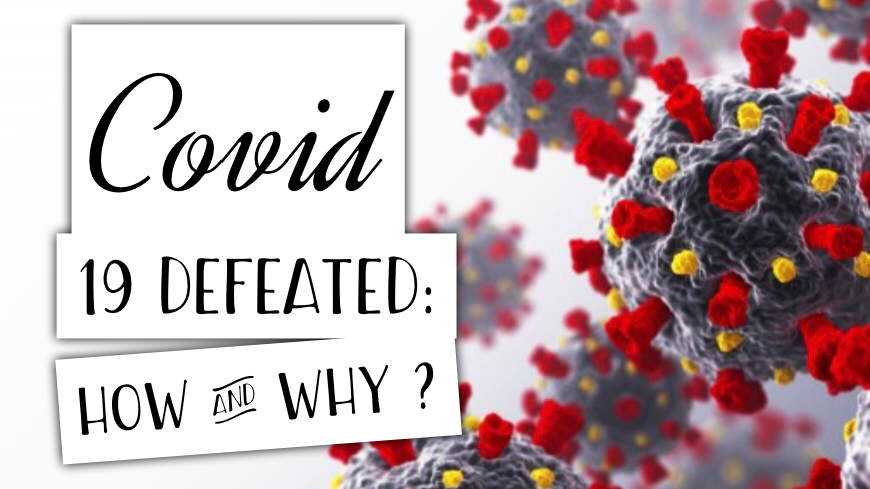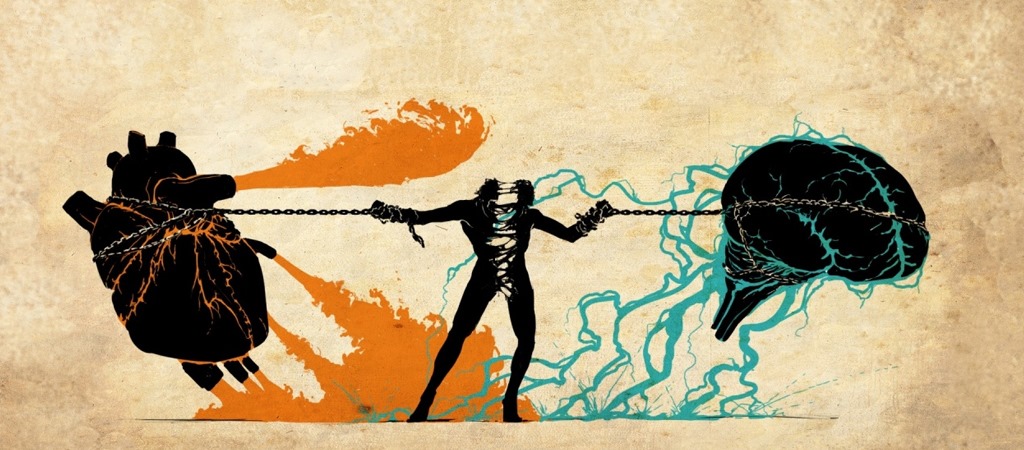Where Did The Evil Come From? The presence of evil in the world has been a reason for a group of people to deny the existence of God. They question: “If God exists, why is there evil in the world?”
In fact, this question is a logical fallacy that could be handled by the proper understanding of the attributes of God, the reality of this short life and the purpose of our existence.
Here we will learn the following:
- What is Evel?
- Does The Presence Of Evil Deny The Existence of God?
- If God Is Good, Why Did He Create Evil?
- Examples On The Goodness behind Evil
- What Is The Reality of Life?
- Did God Create Evil And What Is The Root Of Evil?
- Examples of Common Life Tests
- The Prevalence Of Goodness
- If God Created Everything, Why Did He Create Evil?
What is Evel?
In philosophy, the concept of evil is approached from various angles. Moral philosophers debate whether evil is an objective violation of universal moral standards or a subjective, culturally relative notion. Metaphysically, dualistic views posit evil as a force opposing good, while monistic perspectives see it as a privation of good. Theodicy addresses the challenge of reconciling evil with the existence of a benevolent deity.
Existentialists focus on the subjective experience of evil, emphasizing individual responsibility. Political philosophy explores evil in the context of oppressive regimes and human rights violations. Some philosophers adopt ethical skepticism, questioning the objective reality of moral values, including evil. The nature and existence of evil remain complex and diverse topics within philosophical discourse.
Does The Presence Of Evil Deny The Existence of God?
Does the problem of evil really deny the existence of God?
The British philosopher David Hume said:
“Is God willing to prevent evil, but not able? Then he is impotent.
Is he able, but not willing? Then he is malevolent.
Is he both able and willing? What then is evil?”
According to Hume’s words, the problem deals with God’s attributes, not His existence. Hume denies the existence of an impotent, malevolent or evil God. We agree with this point; as the problem of evil obviously doesn’t oppose the existence of a Creator (God), rather it is related with His attributes.
A simple example to clarify that; if we see a great, state-of-the-art working program, we will instantly know someone designed and coded it. If we have unanswered questions concerning this work, we won’t deny its intelligent programmer in the first place.
If God Is Good, Why Did He Create Evil?
God told us in His final preserved revelation (the Qur’an) that He is the All-knowing, the All-wise, the Merciful, and He has the perfect Attributes.
God is good, but he is also wise. God is good, yet he is All-Knowing; He knows the unseen, the near and far future, the past, the most far object, the tiniest details…etc.
“And with Him are the keys of the unseen; none knows them except Him..”
[Qur’an 6-59]
According to our limited human perspective, we could perceive something to be evil, yet, if we know its true, complete context, we will conclude it is a kind of goodness. I remember a scene of a man furiously kicking a cat with people calling him merciless, but when they realized a fast vehicle that was about to kill the animal, they stopped to thank his mercy.
But perhaps you hate a thing and it is good for you, and perhaps you love a thing and it is bad for you. And Allah Knows, while you know not.”
[Qur’an 2 – 216]
Examples On The Goodness behind Evil
In the Qur’an, there are plenty of stories showing the goodness behind evil. The Noble Quran teaches that God’s Wisdom is beyond our limited knowledge. It transcends all human calculation. Besides, this life is full of paradoxes.
To illustrate, here are the lessons presented by Surah Alkahf, (The Cave S: 18): Moses, the Messenger of Allah to the Children of Israel was granted great wisdom. Despite this, he was ordered to learn by a righteous servant of Allah, named Alkhadir about the acts that seem to be evil at first glance while, they are in fact good and pious acts that lead in the end to the good of its recipient.
The First Example: The Owners of the Boat:
The first act that seemed to be evil at first glance was when Moses and Alkhadir (BPBU them) embarked aboard of the boat. Allah Almighty says:
“So they departed. When they boarded a ship, he bored a hole in it. ‘What, have you made a hole in it, ‘ Moses said, ‘is it to drown its passengers? You have done a dreadful thing.’”
(Quran, 18: 71)
Later on, Al Khadir explained the complete event for Prophet Moses (PBUH) saying:
“As for the ship, it belonged to poor people working on the sea. I rendered it imperfect because at some place from them there was a king who was taking every serviceable ship by brutal force.”
(Quran, 18: 79)
Therefore, a tiny damage of a boat belonging to poor sailors was their only way to preserve it against theft by an oppressing king who would take any intact serviceable ship on his way.
The Second Example: Killing of a boy to show mercy to his parents
The second seemingly evil act was when “Thereafter they met a boy and he (Alkhadir) killed him. He (Moses) exclaimed: ‘What, have you killed a pure soul and it was not done (in retaliation) for a soul you have done a terrible thing. ‘
(Quran, 18: 74)
Later, Al Khadir illustrated to Prophet Moses (PBUH): “As for the boy, his parents were believers, and we were afraid lest he should impose on them with his insolence and disbelief. (80) It was our wish that their Lord should grant them (his parents) another in exchange, another better in purity and tenderness.”
(Quran, 18: 81)
Thus, God–by His Wisdom–took the soul of a boy who would be one of the rightful owners of Hell to save him and his parents from Fire. No one but Allah is permitted to do so.
As we previously discussed, we cannot know the wisdom behind everything. However, there are life stories that show people who went through hardships that they thought would ruin them. However, if they were given the chance to return to the past, would choose the same choices they previously thought to be evil.
What Is The Reality of Life?
Allah Almighty illustrates the reality of this life saying:
“And this worldly life is not but diversion and amusement. And indeed, the home of the Hereafter – that is the [eternal] life, if only they knew.”
[Qur’an 29 – 64]
By all means, it would be too difficult or nearly impossible to realize the justice of God, or the goodness behind what we see evil if we think this life is the end.
Life is too short, it is not the final residence, it is only a short pass for the hereafter where each of us would be tested for his deeds. Allah Almighty says:
Then did you think that We created you uselessly and that to Us you would not be returned?”
[Qur’an 23 – 115]
It is God’s Justice that decided that all of us would return to him on account. The good would receive good and the bad would be justly accounted for what his hands had committed. The ultimate, complete justice is not in this short life, it is there in the hereafter.
Did God Create Evil And What Is The Root Of Evil?
It could be unjust to test people and judge them when they aren’t responsible for their own actions. Because God is just, and because everyone would be held accountable for his own deeds, There should be a kind of free will.
Each human being the free will to choose to either obey God or disobey him, do good or do bad. Accordingly, God will hold him accountable on the Day of Judgment.
Among the greatest problems in life is corruption; the main cause of evil. It is caused by the hands of people who chose to do bad and disobey God.
“Corruption has appeared throughout the land and sea by [reason of] what the hands of people have earned ”
[Qur’an 30 – 41]
On The other hand, Some righteous people are tested by hardships they can endure, to test their patience and raise their ranks in the hereafter.
Examples of Common Life Tests
Problems in life could be doors to Paradise. One could be without many good deeds, but his patience could raise him higher than he could expect. Prophet Muhammad (PBUH) said:
When Allah has previously decreed for a servant a rank which he has not attained by his action, He afflicts him in his body, or his property or his children. He then enables him to endure that so that He may bring him to the rank previously decreed from him by Allah.”
[Sunan Abi Dawud 3090]
1- Poverty
For example, poverty -which is one of the most common problems in life- tests the poor’s patience and the rich’s generosity.
The poor people will be faster to enter Paradise as Prophet Muhammad (PBUH) told us:
The poor emigrants will enter Paradise before the rich among them by five hundred years.”
[Jami` at-Tirmidhi 2351]
2- Loss of an Organ
Anas (one of the closest companions of prophet Muhammad) said: I heard the Messenger of Allah (PBUH) saying,
Allah, the Glorious and Exalted said: ‘When I afflict my slave in his two dear things (i.e., his eyes), and he endures patiently, I shall compensate him for them with Jannah (paradise).”
[Al-Bukhari]
3- Loss of a Child
The Messenger of Allah (PBUH) said,
When a man’s child dies, Allah, the Exalted, asks His angels (And He knows), ‘Have you taken out the life of the child of My slave?’… ‘What did my slave say?’ They say: ‘He praised You and said: We belong to Allah and to Him we shall return).’ Allah says: ‘Build a house for my slave in Jannah and name it the House of Praise.”
[At-Tirmidhi]
However, God tests each individual according to his capacity:
Allah does not charge a soul except [with that within] its capacity.”
[Qur’an 2 – 286]
The Prevalence Of Goodness
We obviously notice evil because of the prevalence of goodness, as evil is the exception of the rule. We usually say that a man is ill, not that a man is not ill. However, we unfortunately tend to look at the the empty half of the glass instead of the full half.
If evil was a proof -according to some people- there is no God… Then according to the same argument what is the cause of the goodness in life?
Is it a blind chance? Or The Merciful Creator? Apparently blind chance couldn’t be the cause of a consistent organized thing or state. Then who but God?
If God Created Everything, Why Did He Create Evil?
The problem of evil doesn’t oppose the existence of God, rather it deals with the proper understanding of the attributes of God and the purpose of life. Looking deeply in the subject, we would conclude ‘the problem of evil’ supports the existence of God and His good attributes in several ways:
- The recognition of evil suggests the prevalence of goodness.
- It supports the fact that God is All-Knowing while we aren’t, so His wisdom requires certain things that we may consider as evil while they are not.
- It supports the fact that God is Just, as He gave each individual his free will based on which he will be judged.
- According to God’s Justice the bad and the good won’t be the same at the end.
- Life is too short to be a home for true happiness; it is not more than a test which is nothing compared to the eternal happiness in the Hereafter for those who are righteous.
- Hardships in life are a way for great morals to appear; such as generosity, patience…etc. to separate people out based on their core.
Start a chat now with our team to know more about the Islamic perspective on the problem of evil and how Islam deals with it!






